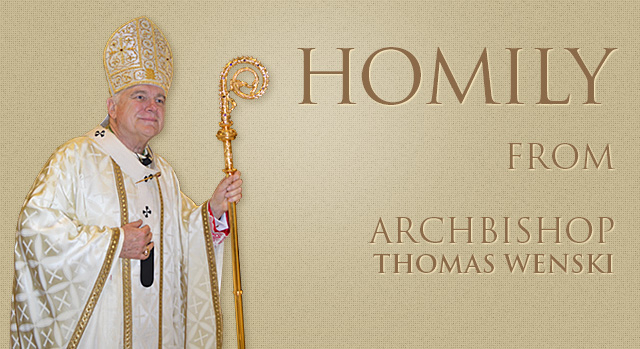By Archbishop Thomas Wenski - The Archdiocese of Miami
Homily by Archbishop Thomas Wenski at Mass during the Men's Conference at St. Mark Church. Saturday, March 18, 2017.
The parable we have just heard in the Gospel reading is perhaps the one that is the most familiar to us of all of Jesus’ parables. The parable is usually referred to as the Parable of the Prodigal Son; but, I think, it would more accurate to call it the “Parable of the Merciful Father.” Here, on display, for us all, is the depth and the breath of God’s love for each one of us.
In the parable, the younger son asks for his share of his inheritance. In doing so, this young man is treating his father as if he were already dead. He wants what is coming to him now � instead of waiting until after his father dies. Like, how cold is that?
Today, we live in a world in which God has been exiled, pushed aside � as it were � to the margins of our lives. Perhaps we don’t hear many people saying that God is dead although at one time, not too long ago, it was fashionable in many circles to say so. But today, we live � or many of us live � as if he didn’t matter which is tantamount to the same thing. And what happens to us when we live our lives, when we organize our society as if God doesn’t matter finds its parallel to what happened to the younger son who wasted his inheritance in a life of dissipation: the world becomes an inhospitable place for man.
From that “inhospitable place” which was the pigs’ sty where the younger son ended up, he finally comes to his senses � and makes his return to his Father’s house. Despite his depravity, he retains the memory of his Father’s goodness. But, as we saw in the parable, the reality of the Father’s goodness far exceeded what the son remembered of that goodness. Even before he gets to the Father’s House his Father rushes out to greet him and he smothers him with kisses and embraces. The Father whom he had treated as if he were already dead rejoices that the son who “was dead has come back to life, who was lost has now been found.”
Who among us can say that we too have not been surprised by God’s goodness? Of course, sometimes, we are hard pressed to understand the ways in which God surprises us. The younger son who expected no more than to be treated as a hired hand by his Father is surprised at his Father’s magnanimity; but so is the elder son surprised � and none too pleased by his Father’s generous forgiveness of his wayward brother. I am sure that not a few of us can readily identify with the anger of the elder son. After all, the Father in killing the fattened calf and giving his young son a new robe and ring is spending what would be by rights the elder son’s inheritance.
But God’s ways are not our ways � and God’s generosity cannot be measured by human standards. The economy of God’s grace is not a zero-sum game � God’s forgiveness given freely to me doesn’t mean that there will be less for you. St. Theresa of Lisieux, the Little Flower, understood this very well. In her “Story of a Soul”, she writes: “What joy to remember that our Lord is just � that he makes allowances for all our shortcomings, and knows full well how weak we are. What have I to fear then? Surely the God of infinite justice who pardons the prodigal son with such mercy will be just with me ‘who am always with him’.”.
Today we all know of those who give God the cold shoulder, or who are angry with God, or for any number of reasons choose to live in alienation and distance from God. And maybe that describes us, if not today, then at one time in our lives. Like that younger son we need to become “homesick” for the Father’s house and then find the courage to return to his embrace in the sacrament of penance, the tribunal of Divine Mercy.
And those who are still out there, in that “inhospitable place,” which is a world in which God doesn’t matter, need to hear the Good News that God still loves them anyway, that he hasn’t forgotten them, that he is waiting for them to begin again by coming to him here at the Eucharistic banquet. No matter how far they come from, not matter how great the distance they have placed between themselves and God, if he sees them coming back home he will rush out, throw his arms around them, embrace them and bring them back into his House.

